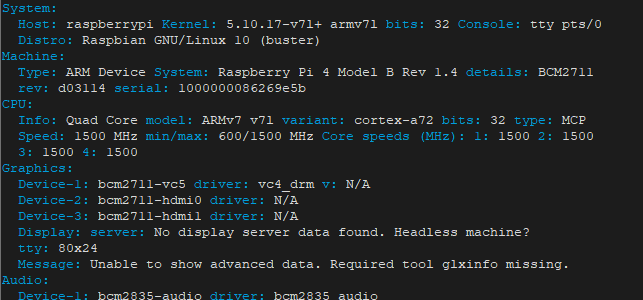The inxi is a command line tool that allows to retrieve details about hardware components on a system such as CPU, RAM, disks, network interfaces, USB controllers, graphics, audio, etc. This tool also shows system info like host, kernel, Linux distribution, etc. The inxi requires the Perl interpreter.
This tutorial explains how to install inxi on Raspberry Pi.
Connect to Raspberry Pi via SSH and download inxi script from GitHub repository to the /usr/local/bin directory.
sudo wget -O /usr/local/bin/inxi https://raw.githubusercontent.com/smxi/inxi/master/inxiNow add execute permission to the script:
sudo chmod a+x /usr/local/bin/inxiThe inxi can be used as a system-wide command for all users. We can check version:
inxi --versionRun the inxi command without any arguments to get short overview of system:
inxiWe can use -F option to retrieve detailed overview of hardware components on a system.
inxi -F
Also possible to get information for specific hardware component. For example:
inxi --cpu
inxi --memory
inxi --disk
inxi --network
inxi --usb
inxi --graphics
inxi --audioUse -h option to display help menu where you can find all available options.
inxi -hIf inxi is no longer necessary, remove a script file:
sudo rm -rf /usr/local/bin/inxi



Leave a Comment
Cancel reply